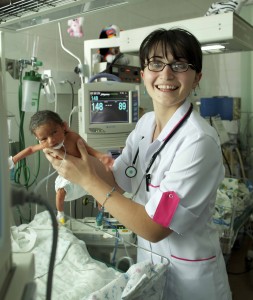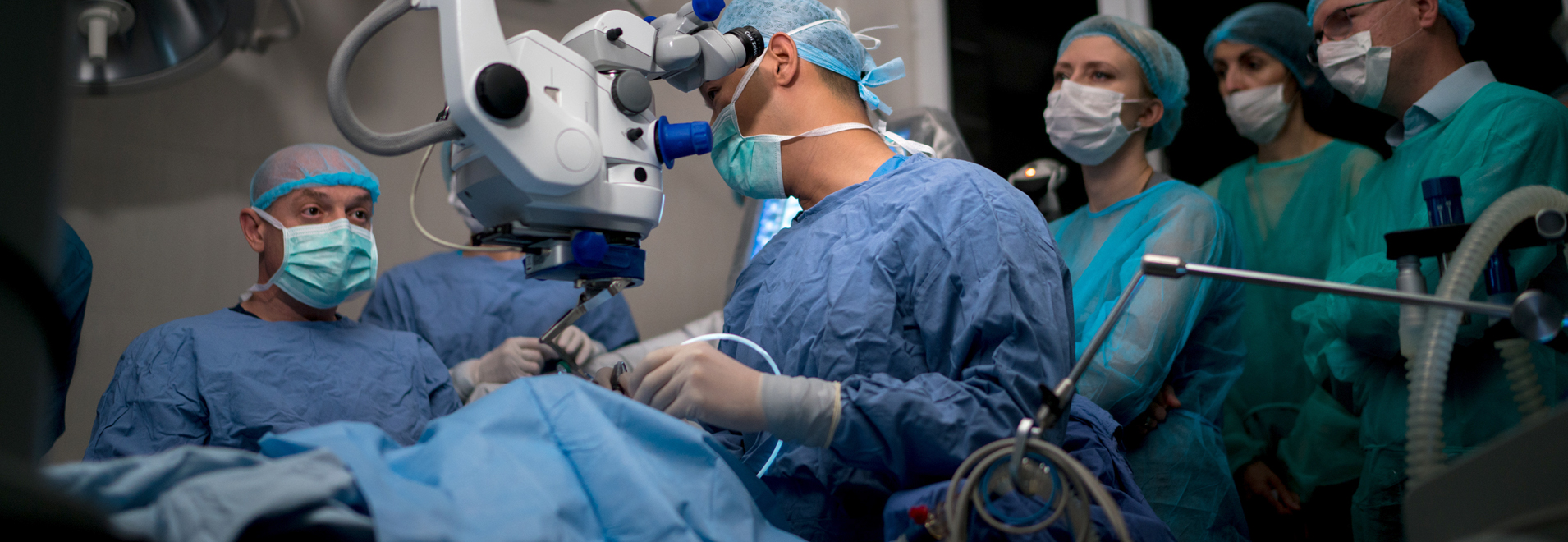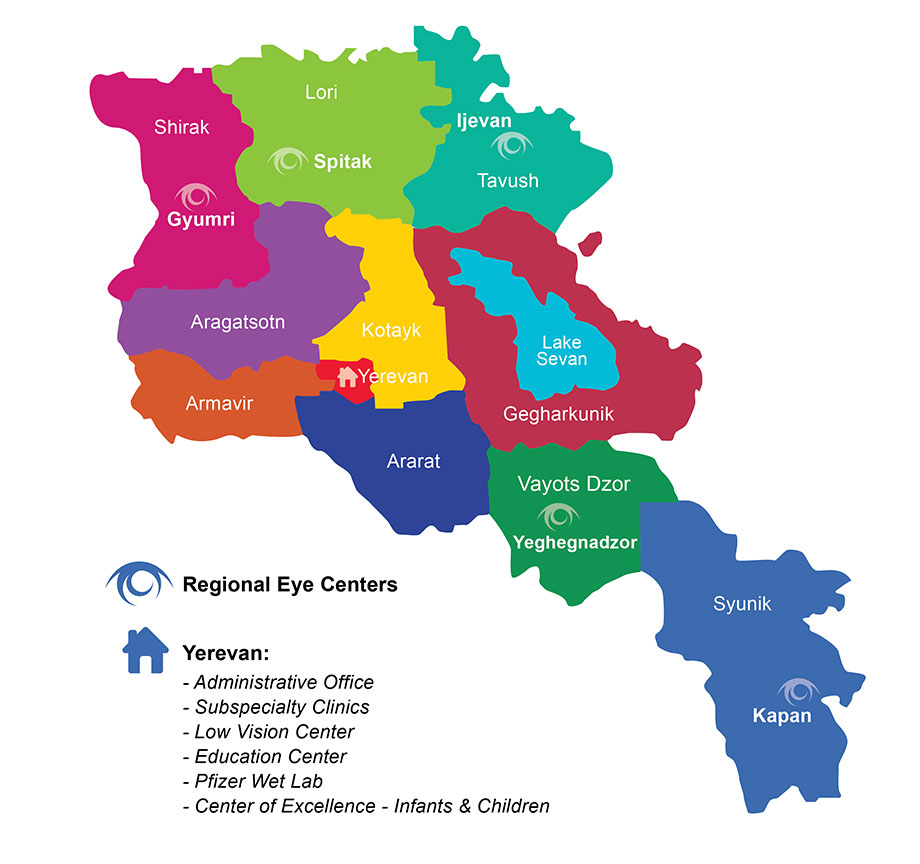Retinopathy of Prematurity (ROP)

Retinopathy of Prematurity (ROP) is a devastating disease that affects infants born prematurely and leads to blindness in a matter of weeks. The enormous economic and social burden of lifelong blindness makes it absolutely critical to treat this disease.
Up to 60 percent of infants born at less than seven to eight months (30 weeks) develop some form of the disease and 10 percent will progress to the advanced form. If left untreated, the advanced form of ROP causes rapid and irreversible blindness due to retinal scarring and detachment. However, timely and repeated examinations of at-risk infants and the application of laser treatments will lead to a complete regression in the disease in up to 90 percent of these tiny patients.
Developing nations like Armenia have only recently developed neonatal intensive care units (NICUs) to provide the necessary inpatient medical care to infants born prematurely. Over the past 10 years, Armenia has established seven NICUs in Yerevan and a handful in remote rural areas. These units now treat approximately 1,600 premature infants per year and this number is expected to grow. Because ROP is a disease affecting premature infants, Armenia now faces a sudden and dramatic rise in the number of children going blind. Unfortunately, over the past 10 years none of the babies at risk for ROP have been screened for the disease, because Armenian ophthalmologists have no experience with ROP. Consequently, an estimated 100-200 infants in Armenia are going blind each year — the result of a treatable cause of blindness. This number is expected to increase dramatically.
As a cautionary tale, the United States experienced a similar trend in the 1940s and ‘50s just after the advent of NICUs resulted in 7,000 American children with blindness.
If the EyeCare Project fails to intervene in Armenia, the resulting epidemic of blindness will have profound social and economic repercussions and have a devastating impact on families and children.
Objectives of ROP Initiative
The overarching objective of EyeCare Project’s Initiative is to provide Armenian ophthalmologists with the ability to avert an epidemic of blindness in their country as a result of Retinopathy of Prematurity—which is what happened in the U.S. in the 1940s and 1950s. Specifically, our objectives are:
- To reduce the rate of blindness in Armenian NICUs from the current estimated level of 30 percent to the U.S. level of 1 percent.
- To train Armenian ophthalmologists to manage a disease they have never seen before, by providing them with the tools and training to care for ROP infants — and then help them carefor such children indefinitely by cultivating national experts in ROP who can teach subsequentgenerations of Armenian physicians.
- To establish teleconferencing centers in AECP Headquarters in Yerevan and CHLA for the continued remote education of ophthalmologists specializing in ROP, in addition to thosespecializing in other aspects of ophthalmology.
- To expand international educational ties through teleconferencing between CHLA and Armenian doctors belonging to other pediatric sub-specialties, such as neonatologists, plasticsurgeons, orthopedic surgeons, hematologists, oncologists, etc.
- To measure the outcome of our training efforts and to establish quantifiable end-points for this training.
- To ensure that Armenia remains committed to providing ROP care beyond this training period by establishing a fair compensation structure in consultation with the Armenian Ministry of Health.
Armenian Infants
Every year we hope to save more than 100 babies in Armenia from permanent blindness. That number will now likely be dramatically higher. The immediate target population for the AECP Initiative is premature infants in NICUs — and there were more than 1,600 infants last year, a number that is expected to grow drastically. During a visit to an NICU during this Medical Mission, we found that more than one out of every three babies had aggressive ROP that required immediate treatment. In comparison, in the United States and other developed countries less than one in 100 premature babies develop severe ROP.
Because of the high incidence of ROP in Armenia, all NICU infants will be examined for signs of impending blindness. In addition, the infrastructure made possible by this grant will permit other pediatric subspecialties to address the needs of hundreds of other patients throughout Armenia.
Progress and Training
The AECP, in partnership with Children’s Hospital Los Angeles Vision Center, has made substantial progress towards its goals. Since we launched our Initiative, more than 6,000 babies in Armenia have been evaluated and eight babies have been treated—saving them from a lifetime of blindness and we have dramatically reduced the incidence of infant blindness from ROP.
During Medical Missions teams of international ophthalmologists provide education for Armenian ophthalmologists and pediatricians through a three-day course of lectures and hands-on instruction. The missions are the beginning of months-long comprehensive training program for Armenia’s physicians with world-wide experts.
The Project has also implemented a telemedicine program so the expert ROP ophthalmologists can train Armenian ophthalmologists in real-time, oversee the care of ROP babies remotely and measure the results of these efforts. A key component of the telemedicine paradigm is the RetCam (donated by Luther Khachigian). (LINKS to Dr. Chen, Telemedicine) This digital camera obtains color images of the retina that can be shared with anyone in the world. This will be the first time the RetCam—which is both a diagnostic and a teaching tool—is used primarily for teaching. To date we have installed RetCams in five of the seven NICUs in Yerevan.
Armenian ophthalmologists are trained to examine the babies using a standard indirect ophthalmoscope and condensing lens and to record their clinical findings on a secure online document. They then take pictures with the RetCam and upload the images to the same document. The remote ROP experts at Children’s Hospital Vision Center and other institutions throughout the world will compare the trainee’s clinical exam with the RetCam images in real-time and provide feedback to the trainees in Armenia providing training and the highest quality care possible.







